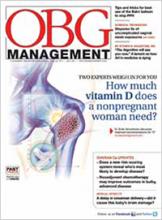“DOES CANCER CAUSE MENORRHAGIA? A LAMENT ON THE DECLINE OF THE ART OF MEDICINE”
STEVEN R. GOLDSTEIN, MD (JULY 2011)
Would you rather be a physician or a technician?
Dr. Goldstein properly decries the loss of the “art” of medicine. A consummate clinician, he points out the absence of the thought process in our modern clinical patient-management algorithm. His discussion is very much in keeping with that of Dr. Allan J. Jacobs, who asked, in a recent article, whether “progress” is good for your patients.1 Dr. Jacobs described how industrialization and bureaucratization have relegated physicians to a subsidiary role.
As a director of patient safety in obstetrics and gynecology at a large community teaching hospital, I have developed a supplementary, or complementary, view of the situation. My roles as a clinician over many years, as a personal patient advocate, and as a recent hospital-bed occupant give me a unique vantage point. Communication and coordination are critical but frequently lacking. While teaching team training courses, I have asked the audience if any members—most of them physicians, nurses, or physician extenders—have experienced a lack of communication during personal or family interactions with clinicians, hospitals, or nursing facilities. The flurry of hands rising into the air is startling.
Technical excellence and advances in materials and machinery are admirable—but we deserve more and will be ill-served if we don’t get more. The question I would ask is whether we want residents to become physicians or technicians. If we can’t get both, we’re doomed. (Professionals in risk management and quality improvement will be nodding their heads as they read this.)
Talking the talk is fine—but, until institutions fund separate divisions to address the issue, it will, sadly, just be talk.
Stephen S. Schuster, MD
Flushing, NY
Two indispensable doctoring skills: inquiry and reflection
Great commentary! I have often used the numerator-denominator approach, as Dr. Goldstein did, to explain risk-benefit alternatives when I talk with patients and colleagues.
I once posed what I thought was a simple and straightforward question to a distinguished perinatologist at a hands-on conference. His reply?
“I’ll need to think about it.”
I think his response was one of the most strikingly honest and stimulating answers I can recall. Teach ‘em how to think, inquire, and reflect! Well done!
John T. Armstrong Jr, MD, MS
Napa, Calif
Dr. Goldstein responds: Critical thinking is lacking
I’ve had the opportunity of late to be involved in team training sessions here at the NYU Langone Medical Center in New York City. There is no question that practices such as ensuring that everyone in the operating room knows one another’s name and that they hold a “time out” before beginning a procedure and a “debriefing” at the end will only enhance patient safety.
The focus of my commentary, however, was the individual interaction between physician and patient—specifically, the ability of the physician to extract historical information from the patient and then apply that information to a broad base of knowledge about normal anatomy and physiology, variations of normal, and clinically relevant pathology. This ability is a skill that I perceive to be not only lacking among students, residents, and, even, junior faculty—it’s not even encouraged!
Dr. Schuster was one of my teachers when I was a medical student and resident—and it is immensely gratifying to have one your teachers, whom you greatly admire, refer to you as a “consummate clinician.” That is quite an honor.
I enjoyed Dr. Armstrong’s anecdote about the need to “think about it.” As my hair has turned gray and I have been honored with the word “Professor” in front of my name, I find that a phrase I use more and more, without fear, is “I don’t know.”
We want to hear from you! Tell us what you think.


